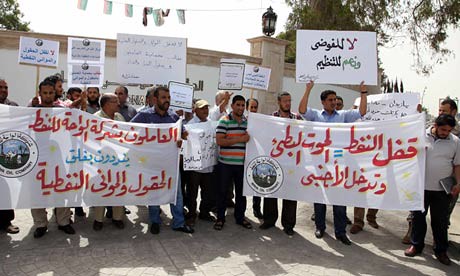
Oil workers protesting in Occupied Libyan capital of Tripoli. The oil industry has nearly ground to a halt from strikes., a photo by Pan-African News Wire File Photos on Flickr.
September 12, 2013
In Libya, Unrest Brings Oil Industry to Standstill
By CLIFFORD KRAUSS
New York Times
Two years after local militias overthrew the Libyan dictator Col. Muammar el-Qaddafi, many of those same fighters have brought Libya’s critical oil industry to a halt, as a challenge to the latest in a series of that country’s interim governments.
Protests and strikes at several large export terminals and oil fields have throttled Libya’s daily oil production to one-tenth its capacity in recent days, jeopardizing the national economy and tightening world oil supplies at a time when unrest is spreading in the Middle East.
Prime Minister Ali Zeidan announced Wednesday that his government had issued arrest warrants for the strike leaders, setting up a potentially critical showdown.
“I won’t let anyone hold Libya and its resources hostage to these groups for long,” Mr. Zeidan told reporters in Libya’s capital, Tripoli, as he announced the arrest warrants. But oil and political analysts expressed doubt that he could enforce his threat since the national military and police forces remain largely impotent.
The crisis began last month when armed groups seized the country’s major oil export terminals, claiming that the national oil company had engaged in corrupt sales. They also demanded autonomy for the eastern region where the rebellion against the Qaddafi government had been strongest. The protests have since moved west, carried out mainly by guards of several oil fields and pipelines seeking higher payments from the government.
As the western protests have grown, local utilities have been forced to cut back power generation, which has caused blackouts. The western protests are backed by the heavily armed Zintan militia, which is based in a western mountain town and has long flexed its muscles to gain influence over the government and nascent security forces.
The Parliament agreed last week to a 20 percent wage increase for civil servants, including the oil security guards. It has also appointed a crisis committee to go from village to village to negotiate with local governing councils allied with the militias.
David L. Goldwyn, the State Department coordinator for international energy affairs in the first Obama administration, characterized the government’s efforts as “a fight-and-talk strategy.”
“The challenge for Zeidan,” Mr. Goldwyn said, “is that it will be difficult to muster the force that will be necessary to make these arrests when some of the militias he would rely on are allied with the strikers.”
Oil, the mainstay of Libya’s economy, has in recent years accounted for 95 percent of the country’s export earnings and 75 percent of government revenues. The government estimates that the country is now losing roughly $130 million a day in oil revenues.
While experts say the government should have six months of reserves to keep the state apparatus functioning, international oil executives are watching developments carefully to see if Tripoli can regain control of the country and ensure security for foreign investment.
“Libya is grinding to a halt,” said Badr J. Jafar, president of Crescent Petroleum, an oil and gas company based in the United Arab Emirates that has had conversations with the Libyan government over investing there. “As with most of the Arab Spring countries, the optimism was short-lived.”
The falling Libyan oil output — which under normal circumstances would represent roughly 2 percent of global supplies — comes at a bad time. Unrest in Syria and Egypt potentially threatens to spread more widely through oil-producing regions of the Middle East, especially Iraq. Persistent attacks on a major pipeline in northern Iraq have already interrupted as much as 150,000 barrels a day of production in recent weeks.
Global oil prices, which have risen moderately over the past month, would probably have climbed much higher had Saudi Arabia not increased its production to the highest level in 32 years to compensate for the lost Libyan crude, oil experts say. Smaller OPEC producers, including Ecuador, Kuwait, Iran and the United Arab Emirates, have also increased production, while production in the United States continues to surge because of a frenzy of shale drilling.
Before the NATO-backed insurrection against the Qaddafi government, Libya produced more than 1.5 million barrels of high-quality crude oil a day, mostly selling to Europe and Asia. Oil production and exports came to a halt during the 2011 revolt, but revived quickly after the fighting ended.
The recovery of the Libyan oil industry helped cushion global markets as the United States and Europe tightened the oil embargo on Iran over the past year or so. International oil companies like Italy’s Eni expressed hopes that they would be able to invest more in the country, finding new reserves and increasing production.
But production fell in recent months to 550,000 barrels a day, and in recent days to as low as 150,000 barrels. Exports have tumbled to 80,000 barrels a day.
Few foreign companies now have more than skeleton crews of expatriates working in the fields, because of the dangerous security situation. OMV, an Austrian oil company that is a major producer in Libya, announced this week that it was suspending production.
“The situation is so bad, it’s unsafe,” said Dragan Vuckovic, president of Mediterranean International, an oil service company that withdrew from Libya during the fighting two years ago and has not yet returned. “Every village has a militia, and there is no central government.”
Mr. Jafar, the United Arab Emirates oil executive, said he would still like to invest in Libya. “It’s all dependent on the fragile security situation,” he said.
No comments:
Post a Comment